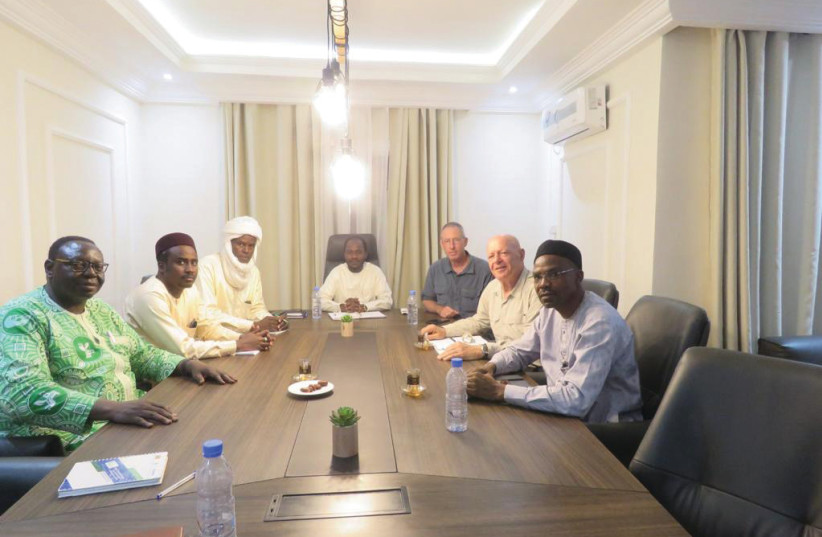The Keren Kayemeth LeIsrael-Jewish National Fund, (KKL-JNF), has become a world force in the fight for a greener more sustainable planet. Since 1961, by special mandate with the government, KKL-JNF operates as the forest service and land development authority in Israel. KKL-JNF’s sustainable development agenda includes, forestry, boosting water resources, combating desertification, holistic planning, land restoration, eco-tourism and education. While always dealing with sustainable development, KKL-JNF is placing more emphasis and resources to help combat climate change.

In addition, KKL-JNF supports the agricultural R&D stations dotted around the country, to advance agricultural technologies, for local farmers. Israel is a country with limited water and land resources, so these stations are critical to maintain Israel’s food security and competitive edge.
At the forefront in forestry
In the last decade KKL-JNF has doubled its efforts in sustainable forestry practices, increased research, fire prevention and upgraded ecosystem services. Forestry is key in adapting to climate change.
Israel is one of the few countries in the world that have a wider expanse of forests than they had a century ago.
KKL-JNF has earned a worldwide reputation as a highly professional organization professional in sustainable forestry practices and experts in dryland forestry. Consequently, many countries and organizations are eager to learn about the expertise it has accumulated as a living lab for dryland forestry, desert agriculture and watershed management techniques.
KKL-JNF has increased its arsenal on fire prevention tools, fire management plans and new rehabilitation programs, that only plant minimally and in a biologically diverse manner.
Forests help regulate climate by absorbing carbon dioxide, preventing soil erosion, by creating carbon soil sinks and providing shade to cool temperatures and regulate rainfall.
KKL-JNF’s international relations team are in continuous contact with major inter-governmental organizations and senior government officials in the respective fields. International cooperation is the only real way to affect climate change which is a global issue.
Cooperation with Chad
KKL-JNF has a rich history of cooperation with various countries in Africa, the Mediterranean, North & South America and Europe.
Recently, KKL-JNF signed an agreement with the Republic of Chad, under which the two countries will cooperate in the areas of forestry, water management and combating the effects of desertification and climate change.
KKL-JNF’s Chief Forester headed a delegation in June to Chad, where they studied the country’s agricultural- forestry situation and its use of water. The aim of the visit was to prepare pilot project proposals in the areas of desert agriculture and watershed management. The projects will aim to increase water resources, prevent desertification and increase small farm desert agriculture. KKL-JNF will also create a platform of knowledge exchange and capacity building.
Improved quality of life in Turkana, Kenya
Turkana is remote province in Kenya, home to some of the world’s oldest human fossils. But unfortunately, today’s locals live in abject poverty. “Furrows in the Desert” aims to change this. A successful project to date, Furrows in the Desert is a collaborative effort between KKL-JNF, the Arava Institute for Environmental Studies, the Missionary Community of St. Paul the Apostle (MCSPA, Kenya), the Caritas Kenya Emergency Relief Organization, and the Turkana Farmers Association.
It is agricultural development program that trains residents to work the land, plant trees and to capture run-off water to increase crop yield and the local biome. KKL-JNF also has provided Israeli-designed solar water pumps --with access to water, the farmers cultivate their crops, ensuring food security and additional income. The project has created over 132 new farms, preventing climate refugees and changing life in the region.
Contributing to the Global Effort
KKL-JNF Chairman Avraham Duvdevani is duly proud of the organization’s activities in regard to climate change and global warming. He says, “KKL-JNF has always been deeply involved in the environment. One of our main tasks is to protect the environment for the benefit of all. We will continue do so, especially in preventing climate change that would harm the environment.”
KKL-JNF’s reputation in regard to environmental issues has spread far and wide. Ronnie Vinnikov is head of Resource Development and External Affairs Division at KKL-JNF. He says, “There is a growing demand in the world for our expertise in technologies and techniques that can improve a country’s quality of life. In response to that demand, we send our teams to do a study of the environment from a holistic perspective. We then make a comprehensive plan to improve their agriculture, water resources, economic opportunities and other aspects pertaining to the environment.”
